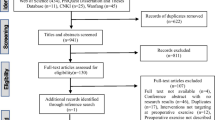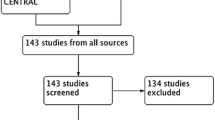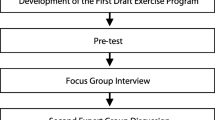Abstract
Background
There is no consensus amongst colorectal surgeons as to whether preoperative exercise is beneficial in the management of colorectal cancer patients. Research has shown higher rates of postoperative complications in patients who are less fit. Agreement needs to be sought on whether improving fitness via exercise should be a part of preoperative care. The Delphi process is an iterative process designed to refine opinions on a subject, until consensus agreement is reached within an expert group.
Methods
We performed a Delphi survey with a group of consultant colorectal surgeons. Statements achieving >80 % agreement were taken as consensus, those achieving >80 % disagreement were removed, and those in between were revised in the following round. The process ended with a group of statements which achieved consensus.
Results
Thirty-two statements were included in the first round of the survey. After three rounds of the survey, 21 statements were accepted as consensus, six statements were rejected, and seven statements did not reach consensus. It was agreed that exercise training should form part of preoperative care and would be supported by surgeons. That suitable programmes pose significant risk to patients was rejected. There was no consensus reached on the strength of current available evidence or whether it would be possible to deliver exercise programmes.
Conclusions
This work is the first to produce a set of statements on which expert consensus opinion has been agreed regarding preoperative exercise in colorectal cancer patients. Future work, informed by this study, will design interventions to produce rapid improvements in fitness before surgery.
Similar content being viewed by others
References
Wydra J, Kruszewski W, Jasiński W et al (2013) Is age a risk factor of postoperative complications in colorectal cancer? Pol Przegl Chir 85:491–495
Bertelsen CA, Andreasen AH, Jørgensen T, Harling H (2010) Anastomotic leakage after anterior resection for rectal cancer: risk factors. Colorectal Dis 12:37–43
West MA, Parry MG, Lythgoe D et al (2014) Cardiopulmonary exercise testing for the prediction of morbidity risk after rectal cancer surgery. Br J Surg 101:1166–1172
West MA, Loughney L, Lythgoe D et al (2015) Effect of prehabilitation on objectively measured physical fitness after neoadjuvant treatment in preoperative rectal cancer patients: a blinded interventional pilot study. Br J Anaesth 114:244–251
Gustafsson UO, Scott MJ, Schwenk W et al (2012) Guidelines for perioperative care in elective colonic surgery: Enhanced Recovery After Surgery (ERAS®) Society recommendations. Clin Nutr 31:783–800
World Health Organization (2010) Global recommendations on physical activity for health. World Health Organization, Geneva
Wesley V (2009) The Delphi technique: a review. Int J Ther Rehabil 16:69–76
Jones LW, Peddle CJ, Eves ND et al (2007) Effects of presurgical exercise training on cardiorespiratory fitness among patients undergoing thoracic surgery for malignant lung lesions. Cancer 110:590–598
Moholdt TT, Amundsen BH, Rustad LA et al (2009) Aerobic interval training versus continuous moderate exercise after coronary artery bypass surgery: a randomized study of cardiovascular effects and quality of life. Am Heart J 158:1031–1037
Meyer P, Normandin E, Gayda M et al (2012) High-intensity interval exercise in chronic heart failure: protocol optimization. J Card Fail 18:126–133
Guiraud T, Juneau M, Nigam A et al (2010) Optimization of high intensity interval exercise in coronary heart disease. Eur J Appl Physiol 108:733–740
O’Doherty AF, West M, Jack S, Grocott MPW (2013) Preoperative aerobic exercise training in elective intra-cavity surgery: a systematic review. Br J Anaesth 110:679–689
Murphy M, Black N, Lamping D et al (1998) Consensus development methods, and their use in clinical guideline development. Health Technol Assess 2:1–88
Acknowledgments
Thanks to the consultants of the Exercise Prehabilitation in Colorectal Cancer Delphi Study Group who participated in this study. The contributors were Patricia Boorman, Steven Brown, Gordon Buchanan, Nicola Fearnhead, Talvinder Gill, Aileen McKinley, Sarah Mills, Deborah Nicol, Stefan Plusa, Rupert Pullen, Mike Saunders, Humphrey Scott, Baljit Singh, Richard Slater, Bob Steele, Siram Subramonia, Arti Varma, Nicholas Watson and Gethin Williams.
Ethical standard
All procedures performed in this study were in accordance with the ethical standards of the University of Nottingham (UK) and with the 1964 Helsinki declaration and its later amendments.
Informed consent
Informed consent was obtained from all individual participants included in the study.
Conflict of interest
None.
Author information
Authors and Affiliations
Consortia
Corresponding author
Appendices
Appendix 1: E-mail invitation to participate in Delphi survey
Dear
I am a surgical research fellow working with Mr Jon Lund and Dr John Williams. We are looking at the benefits of preoperative exercise (“prehabilitation”) for elderly cancer patients prior to their cancer surgery.
Although much is known about the physiological benefits that occur with exercise and there is evidence for the improvement in surgical outcomes for fitter patients, there is no consensus opinion on how this exercise should be delivered in an elderly cancer population.
We are planning a Delphi study to achieve a consensus opinion from colorectal surgeon on the importance of prehabilitation and the practical application of such an exercise programme.
We have written to you as a consultant colorectal surgeon to invite you to take part in the study.
This would require,
-
Your written consent (either signed and returned by post or as an e-signature on a consent form returned by e-mail)
-
Completion of 3 online surveys. Each round will consist of statements to be marked against a Likert scale and the opportunity for further comments. The first survey will contain 40 statements, the second and third survey will contain progressively fewer statements
-
We ask that each survey is returned within the 3 weeks following its distribution. We anticipate that each survey will take approximately 15 min to complete
You will be informed of the consensus findings in a fourth and final e-mail.
The study is anonymous and you will not know who else is taking part.
The survey will be entirely e-mail/internet based.
The Delphi technique is an iterative process that has been used to establish consensus opinion on a variety of topics. After each round the results are anonymised and feedback provided; results are used to inform a subsequent survey instrument for the second round and the process is repeated. Consensus is achieved once >80 % of the expert body agree with a statement, it is then removed from the survey.
It is envisaged that all participants will be acknowledged on publication of this work as members of the Prehabilitation in Colorectal Cancer study group.
We hope that you will be able to help us to develop the body of evidence in this important area of research.
Please let us know if you have any questions about the logistics of the study.
If you are happy to participate please read the attached information sheet and sign and return the consent form. We will be in touch with your password for the survey as soon as the first round opens.
We look forward to hearing from you soon.
Appendix 2: Final results of survey
Statements achieving consensus agreement of the expert group
-
1.
Improved aerobic performance leads to improved preoperative cardiorespiratory function
-
2.
Improved aerobic performance leads to better tolerance of the physiological demands of surgery
-
3.
Improved aerobic performance leads to improved preoperative muscle strength
-
4.
Improved aerobic performance leads to improved preoperative mood and wellbeing
-
5.
Improved aerobic performance leads to reduced postoperative length of stay in hospital
-
6.
Improved aerobic performance leads to reduced postoperative time to mobilise
-
7.
Exercise training could improve aerobic performance
-
8.
Exercise training should be an aspect of preoperative care
-
9.
Preoperative exercise programmes should be designed to improve cardiorespiratory fitness
-
10.
Exercise training could be used to beneficially improve aerobic performance in patients awaiting elective (planned) surgery
-
11.
Exercise training could be used to beneficially improve aerobic performance in patients awaiting urgent (e.g. cancer) surgery
-
12.
Exercise training could be used to beneficially improve aerobic performance in patients between 40 and 60 years old awaiting surgery
-
13.
Exercise training could be used to beneficially improve aerobic performance in patients between 60 and 80 years old awaiting surgery
-
14.
Exercise training could be used to beneficially improve aerobic performance in patients over 80 years old awaiting surgery
-
15.
Exercise training could be used to beneficially improve aerobic performance in patients awaiting laparoscopic surgery
-
16.
Exercise training could be used to beneficially improve aerobic performance in patients awaiting open surgery
-
17.
Exercise training could be used to beneficially improve aerobic performance in patients with benign pathology
-
18.
Exercise training could be used to beneficially improve aerobic performance in patients with malignant pathology
-
19.
Preoperative exercise training programmes would be most useful if they improved aerobic performance within the 31 day time frame allowed for cancer surgery
-
20.
Preoperative exercise training programmes should be designed to give the greatest gain in fitness in the shortest time frame
-
21.
Preoperative exercise training programmes would be supported by you in your own practice.
Statements rejected by the expert group
-
1.
Preoperative exercise programmes should be designed to improve muscle strength only
-
2.
Exercise training could be used to beneficially improve aerobic performance in patients awaiting emergency surgery within 24 h of admission
-
3.
Individually tailored and suitably monitored preoperative exercise training programmes are likely to risk cardiac complications
-
4.
Individually tailored and suitably monitored preoperative exercise training programmes are likely to risk neurological complications
-
5.
Individually tailored and suitably monitored preoperative exercise training programmes are likely to risk respiratory complications
-
6.
Individually tailored and suitably monitored low impact preoperative exercise training programmes are likely to risk musculoskeletal complications.
Statements on which no consensus was achieved among the expert group
-
1.
Improved aerobic performance leads to reduced need for intraoperative vasoactive drugs due to better cardiac performance
-
2.
Improved aerobic performance leads to reduced length of HDU/ITU postoperative stay
-
3.
Preoperative exercise programmes should be designed to improve balance
-
4.
Preoperative exercise programmes should be designed to improve flexibility
-
5.
Individually tailored and suitably monitored high impact preoperative exercise training programmes are likely to risk musculoskeletal complications
-
6.
Preoperative exercise training programmes are already supported by robust evidence of their benefit
-
7.
Preoperative exercise training programmes are deliverable in your hospital.
Rights and permissions
About this article
Cite this article
Boereboom, C.L., Williams, J.P., Leighton, P. et al. Forming a consensus opinion on exercise prehabilitation in elderly colorectal cancer patients: a Delphi study. Tech Coloproctol 19, 347–354 (2015). https://doi.org/10.1007/s10151-015-1317-2
Received:
Accepted:
Published:
Issue Date:
DOI: https://doi.org/10.1007/s10151-015-1317-2




